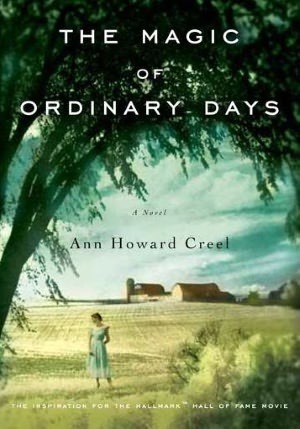Magic of Ordinary Days. Ann Howard Creel. 2001. 304 pages. [Source: Library]
First sentence: I don't often think back to that year, the last year of the war--its days, its decisions--not unless I'm out walking the dawn of a quiet winter morning, when new snowfall has stunned into silence the lands around me, when even ice crystals in the air hold still. On those mornings of frozen perfection, when most living creatures keep to a warm bed or a deep ground hole, I pull on my heaviest old boots and set out to make first tracks through the topcrust and let the early dawn know I'm still alive and appreciating every last minute of her fine lavender light. Then I remember.
Premise/plot: Olivia (Livvy) Dunne finds herself married to a stranger, Ray
Singleton--a farmer--after she finds herself in an unfortunate
situation: she's pregnant. Her father arranges with another minister to
marry off 'poor' Livvy to a good, stable man. The two meet on their
wedding day. She asks him WHY he's willing to marry a stranger and IF
he'll be able to love the baby. His answer surprises her, he feels it's
God's will to bring them together, and, of course, he'll love her baby.
It is the raising of a child that makes a father.
The novel chronicles their lives together that first year as she adjusts
to an isolated country lifestyle, as she tries to find ways to occupy
her time and grasp the fringes of her true dreams. She loves history and
archaeology. She loves finding and discovering old things. She loves
finding out about the past, imagining herself in that past. Ray is only a
little helpful, it is Ray's sister, Martha, who is able to help her the
most. For Martha has stories about their parents, grandparents, etc. It
is Martha who is able to tell her about the settling of the place, the
original structures built, how their family lived and worked and
struggled to create a legacy for the family. And Livvy does see how very
much Ray loves the farm, the land, the strong connection he feels to
the past and present.
Livvy is lonely still, however. She becomes friendly with two Japanese
women living at a nearby Japanese internment camp. She actually meets
them in her own fields--for they have been hired to help with the
harvest. It seems they are an answer to her prayers; they are so nice
and friendly and pleasant to talk with. They even volunteer their
tailoring services--providing her with a maternity dress and suit. But
is the friendship genuine? I think it's as genuine as it can be since
Livvy doesn't like being vulnerable and the two sisters almost by
necessity don't feel comfortable telling all their secrets either. I'm
not even sure Livvy realizes this until the end when she sees that by
protecting herself, protecting her heart, always keeping things inside,
she's keeping love out too.
Livvy's perspective provides insights to readers about what it was like
to live during this time. Livvy tries to keep up with the war through
newspapers--though she has to content herself with news that is a day or
two old since the delivery is so slow. The travel restrictions also
keep Livvy at home with Ray instead of allowing her to visit her family
at Christmas and New Years--like she originally planned. ("I'll Be Home
for Christmas" would have still been a 'new' Christmas song, having been
done in 1943. "Have Yourself a Merry Little Christmas" would have been
another 'new' holiday song first introduced in the 1944 musical, Meet Me
in St. Louis. "The Christmas Song" was written in 1944, but not
recorded until 1946.)
I really enjoyed this novel. I loved Ray and Livvy. I loved Martha and her daughter too.
My thoughts: I've read the book twice now. But I've watched the movie probably twice that. I love, love, love the movie. I do. I enjoy the book as well. Both are wonderful. I do think the book explores things with a little more depth. But the romance perhaps plays better on the screen.
© 2022 Becky Laney of Becky's Book Reviews


1 comment:
I am going to look for this movie!
Thanks for sharing this review with the Historical Fiction Reading Challenge
Post a Comment